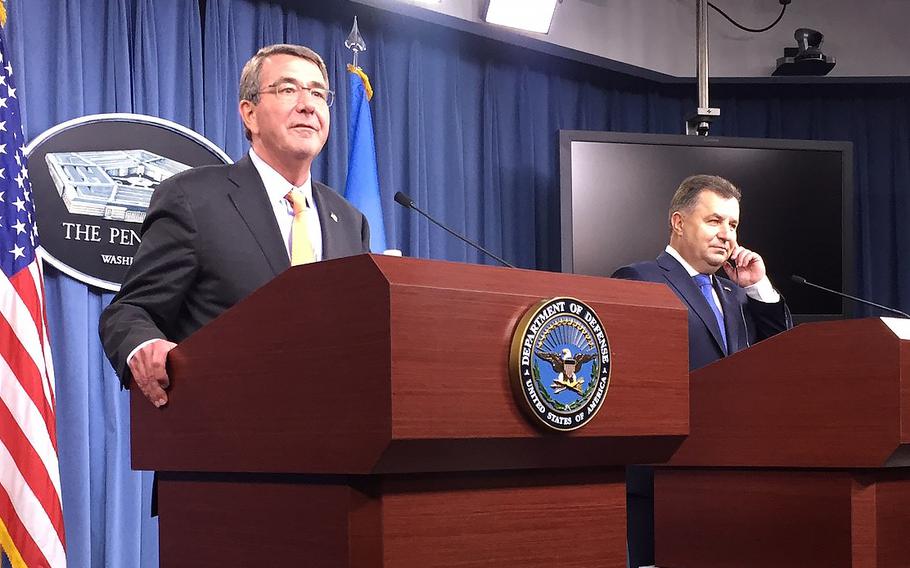
U.S. Defense Secretary Ash Carter and Ukrainian Minister of Defense Colonel-General Stepan Poltorak take questions at the Pentagon in Arlington, Va., on Thursday, Sept. 24, 2015. (Tara Copp/Stars and Stripes)
ARLINGTON, Va. — A Pentagon news conference Thursday meant to show a unified front on U.S. assistance to Ukraine highlighted instead how Russia’s entry into Syria has complicated Washington’s relationship with Moscow.
Ukrainian Defense Minister Col. Gen. Stepan Poltorak, who was visiting the Pentagon, said that Russia’s recent buildup of forces in Syria, its longtime ally, are possibly an effort to divert attention from its actions in Ukraine. Poltorak said Russia has proved that it can’t be trusted.
U.S. Defense Secretary Ash Carter was quick to reassure his Ukrainian counterpart that discussions regarding Syria “will not in any way take away from our strong condemnation of Russian actions in Ukraine or change our sanctions or security support in response to those destabilizing actions.”
Moscow’s intervention in Ukraine last year has heightened tensions between Russia and the United States. Washington backs the new government in Kiev, while Moscow has supported pro-Russian separatists in Ukraine’s east. Washington fears that Moscow’s actions in Syria — the delivery of attack aircraft, tanks and air defense systems — could bolster the regime of Bashar Assad and complicate any mutual fight against the extremist Islamic State group.
Russia’s buildup led last week to the first military-to-military phone call between Carter and his Russian counterpart, Defense Minister Sergei Shoigu.
President Barack Obama and Russian President Vladimir Putin are expected to discuss the issue when they meet next week in New York.
Russia’s intervention in Ukraine prompted former Defense Secretary Chuck Hagel to end military-to-military communications with Russia.
Before Thursday’s Pentagon news conference, Carter and Poltorak discussed the training and exercises the U.S. and NATO have been conducting to strengthen the alliance’s eastern flank in the wake of Russia’s annexation of Ukraine’s Crimea Peninsula in March 2014.
Washington and the European Union have imposed sanctions on Russia in response to its intervention, while the U.S. and NATO allies have stepped up the pace of exercises and demonstrations of military strength in the member countries along Russia’s periphery. Russia has responded in kind with large-scale exercises of its own.
U.S. paratroops with the Vicenza, Italy-based 173rd Airborne Brigade have been training Ukrainian guardsmen and soon will begin training active-duty members of Ukraine’s military in western Ukraine.
The U.S. has been providing nonlethal aid to Ukraine, but the Obama administration has resisted calls to provide arms.
Ukraine has repeatedly requested anti-tank systems and other weaponry that could enable it to more effectively fight the separatists, but the Obama administration has held firm that aid would be limited to defensive items.
In Thursday’s visit, lethal weaponry “was not on the table,” Poltorak said.
When a Ukrainian journalist asked Carter why the Pentagon would ship lethal arms to moderate Syrian rebels and not to Ukraine’s defenders, Carter seemed caught off guard.
He didn’t answer the question, noting only that discussions on lethal weapons were not on the agenda Thursday.
Poltorak said he would welcome weapons assistance from the U.S. or anyone who “would help protect our country.”
Twitter: @TaraCopp